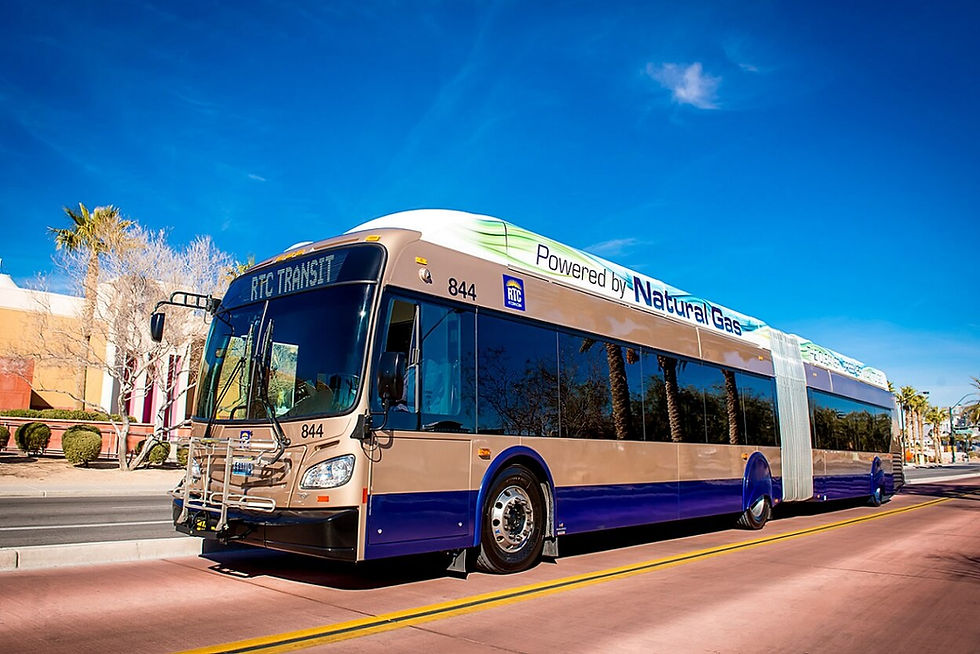Las Vegas needs more spare buses, a federal rule prevents it
- Las Vegas Tribune News

- Sep 11, 2025
- 3 min read
Nevada Current
Extreme heat, long operation hours, and an influx of millions of tourists a year creates a perfect storm for bus fleets in Las Vegas, leading to rapid wear-and-tear and more service outages.
Those service outages are exacerbated by a federal rule that caps the number of spare buses a transit agency can maintain at 20 percent of their overall bus fleet, regardless of how many more buses a transit service needs to maintain reliable service.
Transit agencies that keep more spare buses than allowed risk losing federal funding if they aren’t granted an exemption from the Federal Transit Authority (FTA) for additional spare buses. However, the federal agency has never granted a waiver for additional buses to any state.
Southern Nevada’s congressional delegation is now asking the FTA to remove or increase its cap on the number of spare buses the Regional Transportation Commission of Southern Nevada (RTC) can maintain in Las Vegas.
Southern Nevada’s transit authority operates a fleet of over 400 buses and relies on FTA funding to purchase both active and spare buses, but federal limits on spare buses have strained operations.
In a letter Thursday Democratic U.S. Sens. Jacky Rosen and Catherine Cortez Masto — along with Reps. Susie Lee, Steven Horsford, and Dina Titus — said “transit agencies across the country face a variety of operational and environmental challenges that often require maintaining spare bus ratios above the current 20 percent cap.”
“Las Vegas, like many western cities, experiences extreme heat that accelerates bus wear and increases breakdown frequency, requiring more frequent maintenance to keep vehicles operational. This puts significant strain on RTC’s fleet, as insufficient spares can lead to service disruptions for the approximately 80 percent of Las Vegas riders who rely on transit for commuting to work,” wrote the delegation.
High transit demand and the extreme desert climate leads to rapid wear and tear on buses in Las Vegas, especially for high-mileage buses operating routes with long hours.
Unlike many other cities, tourism and a non-traditional workforce in Las Vegas creates high peak demand for transit service throughout the day, with some routes operating 24 hours daily.
Asphalt in the city can also reach temperatures of more than 140 degrees Fahrenheit in the summer, according to the RTC, increasing maintenance needs for buses traveling on hot roads throughout the entire day and reducing the fleet’s availability.
Frequent special events that attract thousands of tourists at a time also complicates bus management, placing further strain on an already stretched fleet.
Conventions and sporting events frequently create a surge in ridership that requires more spare buses to provide reliable transit, said the RTC.
“Las Vegas’s vibrant tourism economy depends on reliable transit service to transport millions of visitors, not just year-round residents, especially during major events such as the Super Bowl, Formula 1 Grand Prix, FIFA tournaments, and large concerts,” wrote the delegation.
Southern Nevada’s transit authority said they have worked to address frequent breakdowns in their fleet by prioritizing preventative maintenance, including regularly performing cooling system checks and addressing common wear-and-tear issues like battery and alternator failures exacerbated by the intense heat.
But more flexibility on spare buses allowed in a fleet is needed so “agencies like RTC of Southern Nevada to better maintain reliable, safe, and equitable service for their communities,” reads the letter.
*
Jeniffer Solis was born and raised in Las Vegas, Nevada where she attended the University of Nevada, Las Vegas before graduating in 2017 with a B.A in Journalism and Media Studies.







_edited_edited.jpg)
Comments